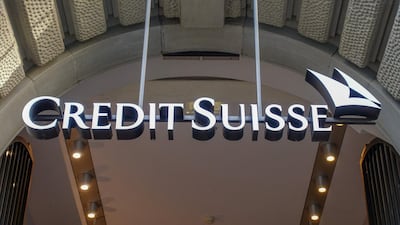Credit Suisse Group chief operating officer Pierre-Olivier Bouee resigned in effort to draw a line under a spying scandal that has rocked Switzerland’s financial circles and which the lender said caused severe reputational damage to the bank.
Mr Bouee, a long-time associate of chief executive Tidjane Thiam, assumed responsibility for the surveillance of former Credit Suisse executive Iqbal Khan, along with the bank’s head of security. The board of directors said that the decision to shadow Mr Khan was “wrong and disproportionate” and taken without Mr Thiam’s knowledge. The investigation found no evidence that Mr Khan was trying to poach clients, according to a Tuesday statement.
“The COO said that he alone, in order to protect the interests of the bank, decided to initiate the observation of Iqbal Khan," the bank said. The investigation “didn’t identify any indication that the CEO had approved the observation”.
The scandal took on another dimension on Monday evening after it emerged that a Credit Suisse contractor who hired private detectives on behalf of the bank to follow Mr Khan killed himself. Swiss financial blog Inside Paradeplatz first reported the man’s death, identifying him only as T. The man took his own life last Tuesday, according to Thomas Fingerhurth, a lawyer for private investigative firm Investigo.
Chairman Urs Rohner is trying to contain a drama that started in the local tabloids a week ago, when it emerged that the bank hired a private investigation firm to shadow its former employee because of fears he would poach former colleagues after deciding to move to UBS. The surveillance resulted in a confrontation in downtown Zurich between Mr Khan and investigators, and has since engulfed chief executive Mr Thiam, who was said to have had a personal dispute with Mr Khan.
The resignation removes a longtime associate of Mr Thiam and close ally in Credit Suisse whose career has closely followed that of his own. They both moved to Prudential in 2008 from Aviva, where they worked together for about four years. Mr Bouee started his career in the French Treasury before he moved to McKinsey & Co in 2000, where Mr Thiam also worked.
He was named his chief of staff at Credit Suisse in 2015 and later became chief operating officer, responsible for global operations, IT and security. As such, any official surveillance fell under his purview. Without citing sources, Swiss daily Tages-Anzeiger had reported earlier that the surveillance was ordered by Mr Bouée and his global head of security Remo Boccali. The bank said today it also accepted the resignation with immediate effect of the head of global security services.
Credit Suisse said James B. Walker, who currently holds senior roles in the bank’s finance organisation, will be appointed as chief operating officer and member of the executive board with immediate effect.
While it’s common for banks to try to prevent staff who leave from poaching colleagues, the spying case has shaken Switzerland’s reputation for quiet professionalism and raised questions about who ordered the surveillance and who knew about it.
With the Mr Bouée resignation, Mr Thiam is being spared responsibility for the drama after coming under criticism when it emerged that he and Mr Khan had a falling out at a party in Mr Thiam’s house in January. The two men are neighbors in the upscale neighborhood of Herrliberg outside Zurich, and Mr Khan had enjoyed a rapid rise through the ranks of Credit Suisse, promoted by Mr Thiam to lead a key unit.
But their relations soured this year and their rift had been an open secret inside Credit Suisse for months. In February, Mr Khan was being passed over in a corporate reorganisation that saw two colleagues elevated. By July, he had decided to leave the bank and the following month agreed to join UBS.
One of the bank’s top investors defended Mr Thiam against criticism, including from former Credit Suisse chief executive Oswald Gruebel, warning that his ouster would hurt the bank.
“It would be damaging to CS and its stakeholders to lose any member of senior management over this issue,” David Herro, deputy chairman of Chicago-based Harris Associates, said before the decision.

